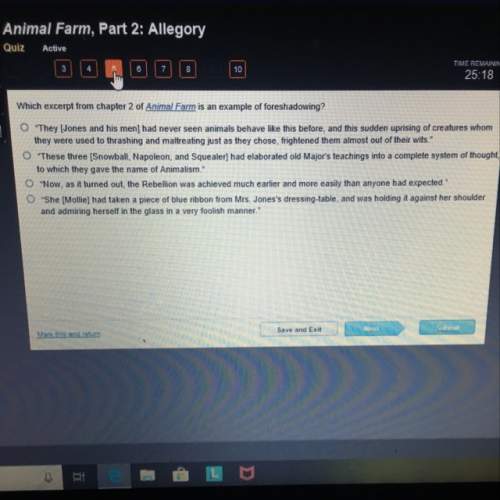
Read the excerpt from Hamlet, Act I, Scene ii.
Claudius: Take thy fair hour, Laertes; time be thine,
And thy best graces spend it at thy will.
But now, my cousin Hamlet, and my son,—
Hamlet: [Aside.] A little more than kin, and less than kind.
Claudius: How is it that the clouds still hang on you?
Hamlet: Not so, my lord; I am too much i’ the sun.
What is the most likely reason that Shakespeare chose this point in the play to give Hamlet his first aside?
Shakespeare is alerting the audience to the conflict between Claudius and Hamlet.
Shakespeare is making sure the audience knows early on that Hamlet is a tragic hero.
Shakespeare is contrasting Hamlet with Laertes to create suspense for the audience.
Shakespeare is hinting to the audience that Claudius will cause an unhappy ending for Hamlet.

Answers: 2


Other questions on the subject: English

English, 22.06.2019 08:00, iluminatioffial9699
Alberto is reading a myth. he wants to learn about the cultural context of the myth-tellers. to do so, he will write a question about each of the four aspects of cultural context. he has written the following question: what kinds of ceremonies or celebrations did the people of this culture practice? which aspect of cultural context does the question address? lifestyle setting customs values
Answers: 1


English, 22.06.2019 14:30, elijiahman99
What examples of the supernatural appear in macbeth
Answers: 1

English, 22.06.2019 15:50, chaparro0512
Something there is that doesn't love a wall, that sends the frozen-ground-swell under it, and spills the upper boulders in the sun; and makes gaps even two can pass abreast. the work of hunters is another thing: i have come after them and made repair where they have left not one stone on a stone, but they would have the rabbit out of hiding, to the yelping dogs. the gaps i mean, no one has seen them made or heard them made, but at spring mending-time we find them there. whom does the speaker blame for the gaps in the wall? himself his neighbor nature and hunters rabbits and dogs
Answers: 2
You know the right answer?
Read the excerpt from Hamlet, Act I, Scene ii.
Claudius: Take thy fair hour, Laertes; time be thine...
Questions in other subjects:


Mathematics, 22.01.2021 23:00

History, 22.01.2021 23:00



Mathematics, 22.01.2021 23:00

History, 22.01.2021 23:00

History, 22.01.2021 23:00

English, 22.01.2021 23:00




